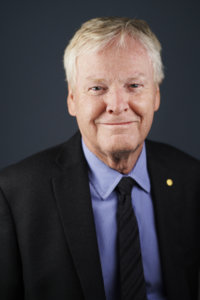Nobel Prize Inspiration Initiative

© Nobel Media AB. Photo: A.Mahmoud
Michael Young is Richard and Jeanne Fisher Professor and head of the laboratory of genetics at the Rockefeller University. He is also the university’s Vice-President for academic affairs. Young received a B.A. in biology in 1971 and a Ph.D. in genetics in 1975, both from the University of Texas, Austin. His graduate work, with Burke Judd, examined gene sizes and distributions in the chromosomes of Drosophila. He moved to Rockefeller in 1978, following postdoctoral work on transposable elements with David Hogness at the Stanford University School of Medicine.
In the late 1970s, Young began to use the fruit fly, Drosophila, to explore the molecular bases of circadian rhythms, the daily behavioural and physiological cycles observed in most organisms. Molecular and genetic screens in his laboratory identified six genes that are involved in the formation of a biochemical oscillator with a periodicity close to 24 hours. Interactions among these genes, and their proteins, contribute to a network of molecular oscillations that emerge within most tissues at the level of single cells. Most of the “clock genes” discovered by Young and his colleagues in Drosophila are also central to the circadian pathways of vertebrates. Recently Young’s laboratory showed that a prevalent human sleep disorder is caused by dysfunction of such a well-conserved circadian clock gene.
Young’s elected memberships include the U.S. National Academy of Sciences, the American Philosophical Society, the President’s Council of the New York Academy of Sciences, the American Academy of Microbiology, and the Physiological Society, London (honorary). Along with colleagues Jeffrey Hall and Michael Rosbash, he received the 2009 Gruber Neuroscience Prize, 2011 Horwitz Prize, 2012 Canada Gairdner International Award, 2012 Massry Prize, 2013 Wiley Prize, 2013 Shaw Prize and the 2017 Nobel Prize in Physiology or Medicine for discoveries of molecular mechanisms that control circadian rhythms.
Read more about Michael Young and the 2017 Nobel Prize in Physiology or Medicine.